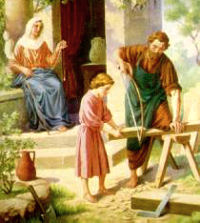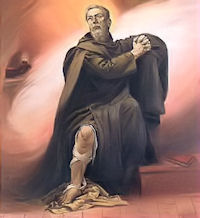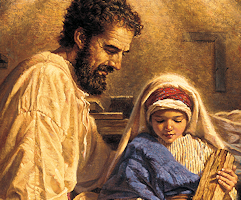Easter: May 1st
Monday of the Fourth Week of Easter; Opt. Mem. of St. Joseph the Worker
Other Commemorations: St. Peregrine, Religious (RM)
» Enjoy our Liturgical Seasons series of e-books!
The Optional Memorial of St. Joseph the Worker was established by Pope Pius XII in 1955 in order to Christianize the concept of labor and give to all workmen a model and a protector. By the daily labor in his shop, offered to God with patience and joy, St. Joseph provided for the necessities of his holy spouse and of the Incarnate Son of God, and thus became an example to all laborers. "Workmen and all those laboring in conditions of poverty will have reasons to rejoice rather than grieve, since they have in common with the Holy Family daily preoccupations and cares" (Leo XIII).
The Roman Martyrology commemorates St. Peregrine Laziosi (1260-1345). Peregrine was a member of the noble family of the Lazioli in Central Italy. He became a Servite Brother, and lived in Servite Monastery in Forli. He was known as a fervent preacher, excellent orator, and gentle confessor. He was miraculously cured of cancer, and lived 20 years after the miracle, dying at the age of 85 from natural causes. He is often invoked for those fighting cancer.
St. Joseph the Worker
"May Day" has long been dedicated to labor and the working man. It falls on the first day of the month that is dedicated to the Blessed Virgin Mary. Pope Pius XII expressed the hope that this feast would accentuate the dignity of labor and would bring a spiritual dimension to labor unions. It is eminently fitting that St. Joseph, a working man who became the foster-father of Christ and patron of the universal Church, should be honored on this day.
 The texts of the Mass and the Liturgy of the Hours provide a catechetical synthesis of the significance of human labor seen in the light of faith. The Opening Prayer states that God, the creator and ruler of the universe, has called men and women in every age to develop and use their talents for the good of others. The Office of Readings, taken from the document of the Second Vatican Council on the Church in the modern world, develops this idea. In every type of labor we are obeying the command of God given in Genesis 2:15 and repeated in the responsory for the Office of Readings. The responsory for the Canticle of Zechariah says that "St. Joseph faithfully practiced the carpenter's trade. He is a shining example for all workers." Then, in the second part of the Opening Prayer, we ask that we may do the work that God has asked of us and come to the rewards he has promised. In the Prayer after Communion we ask: "May our lives manifest your love; may we rejoice for ever in your peace."
The texts of the Mass and the Liturgy of the Hours provide a catechetical synthesis of the significance of human labor seen in the light of faith. The Opening Prayer states that God, the creator and ruler of the universe, has called men and women in every age to develop and use their talents for the good of others. The Office of Readings, taken from the document of the Second Vatican Council on the Church in the modern world, develops this idea. In every type of labor we are obeying the command of God given in Genesis 2:15 and repeated in the responsory for the Office of Readings. The responsory for the Canticle of Zechariah says that "St. Joseph faithfully practiced the carpenter's trade. He is a shining example for all workers." Then, in the second part of the Opening Prayer, we ask that we may do the work that God has asked of us and come to the rewards he has promised. In the Prayer after Communion we ask: "May our lives manifest your love; may we rejoice for ever in your peace."
The liturgy for this feast vindicates the right to work, and this is a message that needs to be heard and heeded in our modern society. In many of the documents issued by Pope John XXIII, Pope Paul VI, the Second Vatican Council and Pope John Paul II, reference is made to the Christian spirit that should permeate one's work, after the example of St. Joseph. In addition to this, there is a special dignity and value to the work done in caring for the family. The Office of Readings contains an excerpt from the Vatican II document on the modern world: "Where men and women, in the course of gaining a livelihood for themselves and their families, offer appropriate service to society, they can be confident that their personal efforts promote the work of the Creator, confer benefits on their fellowmen, and help to realize God's plan in history" (no. 34).
—Excerpted from Saints of the Roman Calendar by Enzo Lodi
Patronage: against doubt and hesitation; against pain; dying people; exiles; expectant mothers; families; fathers; happy and holy death; house hunters; immigrants; interior souls; married people; orphans; people who fight Communism; pioneers; pregnant women; social justice; travellers; unborn children
Vocational: accountants; attorneys; barristers; bursars; cabinetmakers; carpenters; cemetery workers; children; civil engineers; confectioners; craftsmen; educators; emigrants; furniture makers; grave diggers; joiners; laborers; lawyers; solicitors; teachers; wheelwrights; workers; working people
Church: Catholic Church; Oblates of Saint Joseph; protection of the Church; Universal Church; Vatican II
Countries: Americas; Austria; Belgium; Bohemia; Canada; China; Croatia; Croatian people; Indonesia; Korea; Mexico; New France; New World; Papal States; Peru; Philippines; Russia; Vatican City; Vietnam
See CatholicSaints.info for further listings of patronages for dioceses and cities around the world.
Symbols and Representation: Bible; branch; carpenter's square; carpenter's tools; chalice; cross; hand tools; infant Jesus; ladder; lamb; lily; monstrance; old man holding a lily and a carpenter's tool such as a square; old man holding the infant Jesus; plane; rod
Highlights and Things to Do:
- Listen to the Catholic Culture Podcast reading Pope St. John Paul II—Redemptoris Custos: On the Person and Mission of St. Joseph in the Life of Christ and of the Church
- Read more about St. Joseph the Worker:
- May 1 is celebrated in Communist countries as the Day of the International Solidarity of Workers. Today would be a good day to pray for atheistic Communism's influence to cease and a proper application of the principles explained by Leo XIII in Rerum novarum and John Paul II in Centesimus annus to be the guide used by nations.
- Read this comparison, May Day the Socialist Worker vs. St. Joseph the Worker.
- Read St. Joseph the Worker on May 1 and Every Day in the National Catholic Register.
- Louisiana in 2021 made May 1 an Annual ‘St. Joseph the Worker Day’ Statewide.
- Consider purchasing and reading Consecration to St. Joseph: The Wonders of Our Spiritual Father by Fr. Donald Calloway.
- The Josephites are a religious order of brothers and priests with the mission of serving African Americans. Visit their site for more information and also some prayers for the feast of St. Joseph the Worker. They are named Josephites because St. Joseph was the first missionary.
- Find some cooking inspiration for this feast day at Catholic Cuisine.
St. Peregrine
 As a young man St. Peregrine was a member of an anti-papal party until he encountered St. Philip Benizi, the head of the Servite order, who had been sent to try to reconcile the divided community. While trying to preach in Forli, Philip was heckled and even struck by Peregrine, who was overcome by momentary political fervor. But that moment also changed Peregrine. He began to channel his energies in new directions, engaged in good works and eventually joined the Servites in Siena and went on to be ordained a priest. Returning to his home town, he founded a new Servite house there and became well known for his preaching and holiness as well as his devotion to the sick and poor.
As a young man St. Peregrine was a member of an anti-papal party until he encountered St. Philip Benizi, the head of the Servite order, who had been sent to try to reconcile the divided community. While trying to preach in Forli, Philip was heckled and even struck by Peregrine, who was overcome by momentary political fervor. But that moment also changed Peregrine. He began to channel his energies in new directions, engaged in good works and eventually joined the Servites in Siena and went on to be ordained a priest. Returning to his home town, he founded a new Servite house there and became well known for his preaching and holiness as well as his devotion to the sick and poor.
One of the special penances he imposed on himself was standing whenever it was not necessary to sit. Over time, Peregrine developed varicose veins and, in turn, cancer of the foot. The wound became painful and diseased and all medical treatment failed. The local surgeon determined amputation of the leg was called for.
Tradition has it that the night before surgery was scheduled, Peregrine spent much time in prayer before the crucified Jesus, asking God to heal him if it was God’s will to do so. Falling asleep at one point, Peregrine had a vision of the crucified Jesus leaving the cross and touching his cancerous leg. When Peregrine awoke, the wound was healed and his foot and leg, seemingly miraculously cured, were saved. He lived another 20 years.
Peregrine was canonized in 1726.
—Excerpted from Saint of the Day: Lives, Lessons and Feast by Leonard Foley, O.F.M.
Patronage: against cancer; against breast cancer; against open sores; against skin diseases; AIDS patients; cancer patients; sick people; diocese of Forli-Bertinoro, Italy; Forli, Italy
Symbols and Representation: being supported by angels while Jesus descends from the Cross to heal him
Highlights and Things to Do:
- Read more about St. Peregrine:
- Read more about the Order of Servites: Catholic Encyclopedia: Order of Servites and their official website in USA: Order of Friar Servants of Mary, USA Province.
- Instead of a prayer shawl to knit or crochet for the sick or homebound, how about crocheting a St. Peregrine Cowl?
- His body rests in the Servite church of Forlì, the Basilica of Saint Pellegrino Laziosi.






